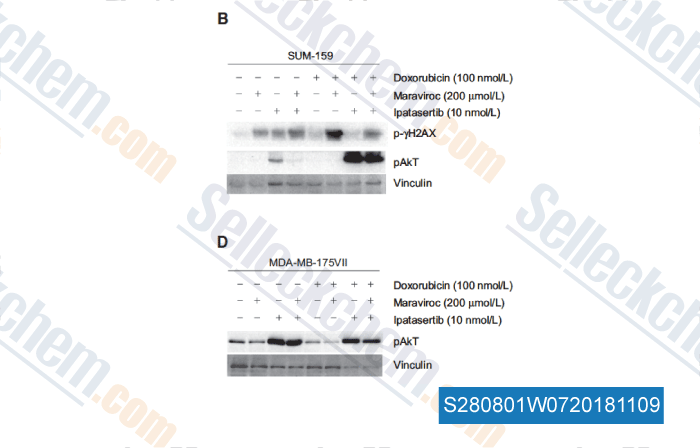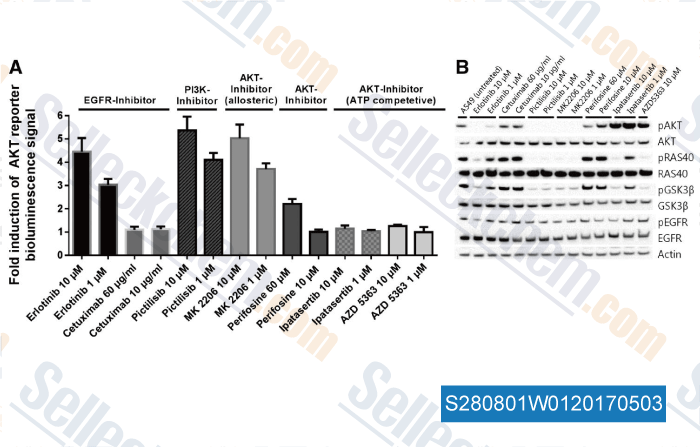|
Toll Free: (877) 796-6397 -- USA and Canada only -- |
Fax: +1-832-582-8590 Orders: +1-832-582-8158 |
Tech Support: +1-832-582-8158 Ext:3 Please provide your Order Number in the email. |
Technical Data
| Formula | C24H32ClN5O2 |
|||
| Molecular Weight | 458 | CAS No. | 1001264-89-6 | |
| Solubility (25°C)* | In vitro | DMSO | 92 mg/mL (200.87 mM) | |
| Ethanol | 92 mg/mL (200.87 mM) | |||
| Water | Insoluble | |||
|
* <1 mg/ml means slightly soluble or insoluble. * Please note that Selleck tests the solubility of all compounds in-house, and the actual solubility may differ slightly from published values. This is normal and is due to slight batch-to-batch variations. * Room temperature shipping (Stability testing shows this product can be shipped without any cooling measures.) |
||||
Preparing Stock Solutions
Biological Activity
| Description | Ipatasertib (GDC-0068, RG7440) is a highly selective pan-Akt inhibitor targeting Akt1/2/3 with IC50 of 5 nM/18 nM/8 nM in cell-free assays, 620-fold selectivity over PKA. Phase 2. | ||||||
|---|---|---|---|---|---|---|---|
| Targets |
|
||||||
| In vitro | Testing against a broad panel of 230 kinases, GDC-0068 only inhibits 3 kinases by >70% at 1 μM concentration (PRKG1α, PRKG1β, and p70S6K, with IC50 of 98 nM, 69 nM, and 860 nM, respectively). GDC-0068 displays >100-fold selectivity for Akt over PKA with IC50 of 3.1 μM. In LNCaP, PC3 and BT474M1 cells, GDC-0068 treatment inhibits the phosphorylation of the Akt substrate, PRAS40 with IC50 of 157 nM, 197 nM, and 208 nM, respectively. Furthermore, GDC-0068 selectively inhibits cell cycle progression and viability of cancer cell lines driven by Akt signaling, including those with defects in the tumor suppressor PTEN, oncogenic mutations in PIK3CA, and amplification of HER2, with strongest effects in HER2+ and Luminal subtypes. [1-4] |
||||||
| In vivo | Oral administration of GDC-0068 in PC3 prostate tumor xenografts model induces down-regulation of p-PRAS40. In BT474-Tr xenografts, GDC-0068 treatment reduces pS6 and peIF4G levels, re-localizes FOXO3a to nucleus, and induces feedback upregulation of HER3 and pERK. Administration of GDC-0068 exhibits potent antitumor efficacy in multiple xenograft tumor models, including the PTEN-deficient prostate cancer models LNCaP and PC3, the PIK3CA H1047R mutant breast cancer model KPL-4, and MCF7-neo/HER2 tumor model. [1-4] |
Protocol (from reference)
| Animal Study: |
|
|---|
References
Customer Product Validation
-S280804W1120150906.gif)
-
Data from [Data independently produced by , , Cell, 2015, 160(1-2): 161-76 ]

-
Data from [Data independently produced by , , Clin Cancer Res, 2018, 78(7):1657-1671]

-
Data from [Data independently produced by , , Neoplasia, 2017, 19(4):310-320]
Selleck's Ipatasertib (GDC-0068) has been cited by 134 publications
| AKT and EZH2 inhibitors kill TNBCs by hijacking mechanisms of involution [ Nature, 2024, 10.1038/s41586-024-08031-6] | PubMed: 39385030 |
| Arachidonic acid released by PIK3CA mutant tumor cells triggers malignant transformation of colonic epithelium by inducing chromatin remodeling [ Cell Rep Med, 2024, S2666-3791(24)00179-4] | PubMed: 38614093 |
| Combined inhibition of CDK4/6 and AKT is highly effective against the luminal androgen receptor (LAR) subtype of triple negative breast cancer [ Cancer Lett, 2024, 604:217219] | PubMed: 39244005 |
| Assessments of prostate cancer cell functions highlight differences between a pan-PI3K/mTOR inhibitor, gedatolisib, and single-node inhibitors of the PI3K/AKT/mTOR pathway [ Mol Oncol, 2024, 10.1002/1878-0261.13703] | PubMed: 39092562 |
| Increased mTOR activity and RICTOR copy number in small cell lung carcinoma progression [ Eur J Cell Biol, 2024, 103(4):151468] | PubMed: 39571513 |
| Down-Regulation of AKT Proteins Slows the Growth of Mutant-KRAS Pancreatic Tumors [ Cells, 2024, 13(12)1061] | PubMed: 38920688 |
| PI3K-dependent reprogramming of hexokinase isoforms controls glucose metabolism and functional responses of B lymphocytes [ iScience, 2024, 27(10):110939] | PubMed: 39635128 |
| GRHL2-HER3 and E-cadherin mediate EGFR-bypass drug resistance in lung cancer cells [ Front Cell Dev Biol, 2024, 12:1511190] | PubMed: 39897079 |
| The highly selective and oral phosphoinositide 3-kinase delta (PI3K-δ) inhibitor roginolisib induces apoptosis in mesothelioma cells and increases immune effector cell composition [ Transl Oncol, 2024, 43:101857] | PubMed: 38412661 |
| IFN-γ decreases PD-1 in T lymphocytes from convalescent COVID-19 patients via the AKT/GSK3β signaling pathway [ Sci Rep, 2024, 14(1):5038] | PubMed: 38424104 |
RETURN POLICY
Selleck Chemical’s Unconditional Return Policy ensures a smooth online shopping experience for our customers. If you are in any way unsatisfied with your purchase, you may return any item(s) within 7 days of receiving it. In the event of product quality issues, either protocol related or product related problems, you may return any item(s) within 365 days from the original purchase date. Please follow the instructions below when returning products.
SHIPPING AND STORAGE
Selleck products are transported at room temperature. If you receive the product at room temperature, please rest assured, the Selleck Quality Inspection Department has conducted experiments to verify that the normal temperature placement of one month will not affect the biological activity of powder products. After collecting, please store the product according to the requirements described in the datasheet. Most Selleck products are stable under the recommended conditions.
NOT FOR HUMAN, VETERINARY DIAGNOSTIC OR THERAPEUTIC USE.
